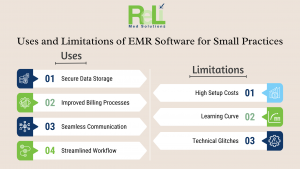All You Need to Know About the Uses and Limitations of EMR Software for Small Practices
In today’s health care world, small practices face many challenges. They need to give good patient care while working with limited resources, small budgets, and a lot of work. EMR Software for Small Practices can help by making things easier to manage and more efficient. But, like every tool, it has both good and bad sides. Let’s take a closer look at what EMR software for small practices can do and what you should think about before using it.
How EMR Software Boosts Efficiency for Small Practices?
Small practices often have less resources but still need to give the same quality care as bigger health care workers. Because of that, being efficient is very important. EMR software helps by automating tasks like keeping track of patient records and scheduling appointments. For example, instead of using paper files, EHR systems store patient information in a digital format. This makes it easy for doctors to find the information they need right away, saving time and avoiding mistakes.
Also, EMR software helps with communication. It lets doctors and patients share important information quickly. This better communication can improve the quality of care, making small practices more competitive in today’s fast health care world. However, these benefits are only part of the story.
Uses and Limitations of EMR Software for Small Practices

Uses:
- Secure Data Storage: EMR software keeps patient records safe. Thus, these digital records are easy to get when needed.
- Improved Billing Processes: RCM systems help make billing faster and reduce mistakes, which makes money management easier.
- Seamless Communication: EMR software helps doctors and patients talk quickly, therefore improving care.
- Streamlined Workflow: Scheduling, reminders, and task tracking automatically reduce work, letting staff focus on patient care.
Limitations:
- High Setup Costs: Setting up EMR software, including hardware, software, and training, can be very expensive for small practices. Because of that, small practices need to plan their budget carefully.
- Learning Curve: Staff may struggle to learn how to use the new system, especially if it’s not easy to use. However, with good training, this can be solved.
- Technical Glitches: Like any technology, EMR systems can have problems or stop working sometimes, which can delay tasks.
Because of these limitations, small practices should carefully think about their needs and resources before using EMR software for small practices. The key is to find a system that gives the most benefit and causes the least trouble.
Cost Considerations for Implementing EMR in Small Practices
Cost is a big factor when choosing EMR software for small practices. While the lasting savings and efficiency improvements can make up for the cost, the initial investment can be hard to handle for small practices. Small practices need to budget for software, hardware, and training. However, there are ways to make EMR adoption cheaper. such as picking a more affordable solution for smaller health care practices can help with the cost. Some companies also offer flexible pricing or subscription plans, which help smaller practices get started without spending too much. Because of that, it’s important to compare options and choose one that fits your budget and needs.
Choosing User-Friendly EMR Software for Small Practices
For small practices, choosing an simple to use EMR software for small practices is very important. If the software is too complicated or hard to use, staff might not want to use it, therefore creating more problems. So, it’s important to choose a system with simple, clear designs and simple features.
But even the best designed software needs some training. Doctors and staff must know how to use the system well. If there’s ongoing support, it becomes easier to fix any problems and keep things running smoothly. Because of that, it’s just as important to choose a provider that offers training and support as it is to pick good software.
Why ReLi Med Solutions is the Right EMR Partner for Small Practices?
When you’re ready to use EMR software for small practices, it’s important to work with the right provider. ReLi Med Solutions offers affordable, easily used EMR software made for small health care practices. Their system has everything small practices need, like secure medical records management, simple features, and better communication tools.
Because they know the challenges small practices face, ReLi Med Solutions provides training and ongoing support to make the change easy. Their team works with you to adjust the system to fit your practice’s needs, making it easy to get started. So, if you want to improve your practice with reliable EMR software for small practices, ReLi Med Solutions is the right partner for you.
Conclusion
EMR software for small practices can change the way your practice works. It can help improve care, make things more efficient, and keep your practice competitive. However, it’s important to think carefully before making a choice. While there are many benefits, there are also costs, a learning curve, and possible technical issues to think about.
By taking the time to understand your practice’s needs, comparing different solutions, and working with a trusted provider like ReLi Med Solutions, you can avoid problems and use EMR technology to its full potential. So, do your research, plan well, and make the right decision because the right EMR system can help your small practice grow and succeed.

